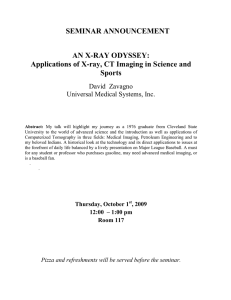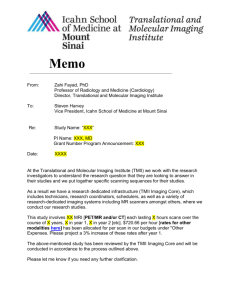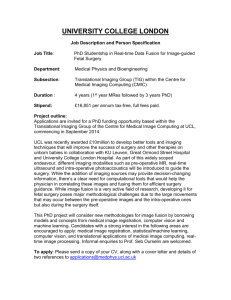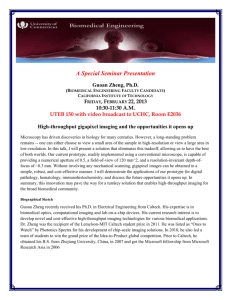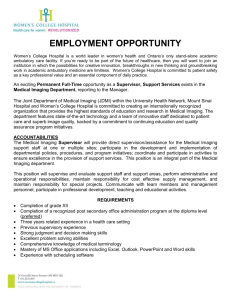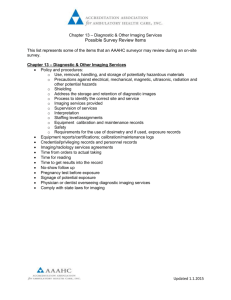ADVANCED BIOMEDICAL IMAGING MSc / 2016/17 ENTRY
advertisement
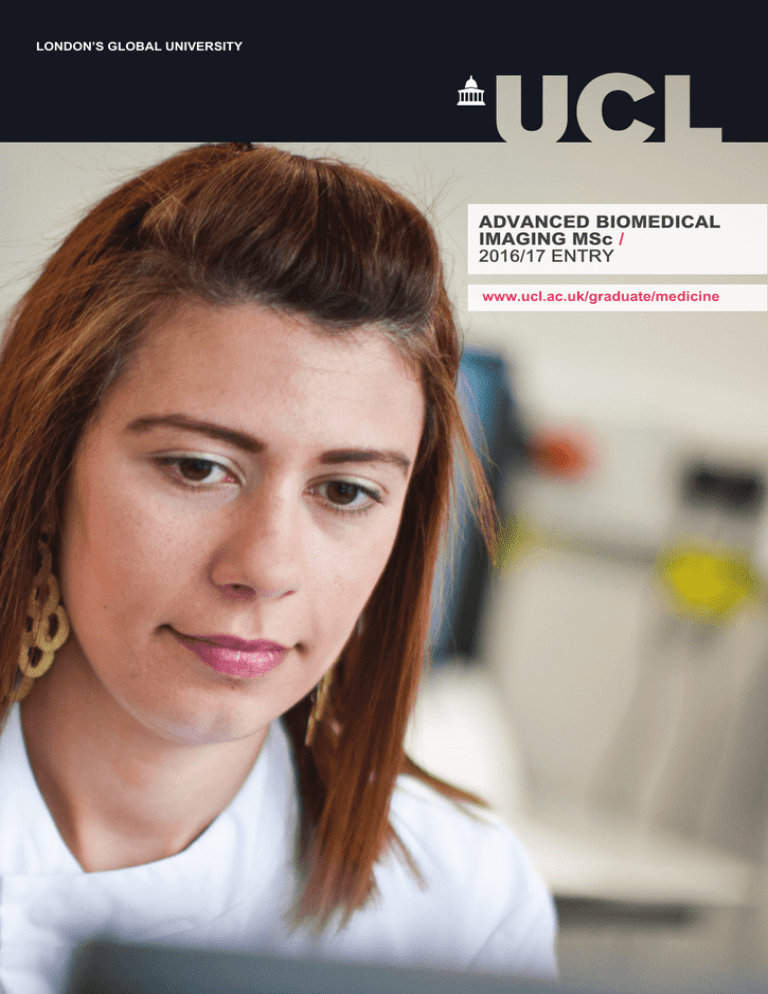
LONDON’S GLOBAL UNIVERSITY ADVANCED BIOMEDICAL IMAGING MSc / 2016/17 ENTRY www.ucl.ac.uk/graduate/medicine Advanced Biomedical Imaging MSc / Imaging has contributed to some of the most significant advances in biomedicine and healthcare and this trend is accelerating. This MSc, taught by leading scientists and clinicians, will equip imaging students from all science backgrounds with detailed knowledge of the advanced imaging techniques which provide new insights into cellular, molecular and functional processes, preparing them for a PhD or a career in industry. Degree summary Imaging is essential for diagnosis of disease and development of novel treatments. This programme focuses on translational medical imaging, and the development and use of preclinical imaging technologies to detect, monitor and prevent illnesses such as cancer, heart diseases and neurodegeneration. Students will undertake an independent research-based project in UCL’s world-class laboratories and develop their communication skills in biomedical science. // UCL offers a world-class environment in medical imaging and hosts several medical and biomedical imaging centres of excellence. // The UCL Centre for Advanced Biomedical Imaging is one of the world’s most advanced imaging centres, with 11 state-of-the-art imaging technologies, and is dedicated to developing imaging techniques of the future. Biomedical imaging is an interdisciplinary field drawing together biology, medicine, physics, engineering, even art. // The MSc is linked to University College London Hospitals (UCLH), including Great Ormond Street Hospital, the UCH Macmillan Cancer Centre and National Hospital for Neurology and Neurosurgery. This will provide an ideal training for further research and applications for a PhD at UCL Centre for Doctoral Training in Medical Imaging. The programme is delivered through a combination of seminars, lectures, laboratory work, site visits and practicals. Assessment is through examination, presentations, essays, practical reports and the dissertation. Degree structure Mode: Full-time: 1 year Students undertake modules to the value of 180 credits. The programme consists of six core modules (120 credits), and a research dissertation (60 credits). A Postgraduate Diploma (120 credits, full-time) is offered. A Postgraduate Certificate (60 credits, full-time) is offered. CORE MODULES // Advanced Biomedical Imaging Techniques I & II // Practical Preclinical Research (including Home Office Personal Licence) // Translational Medical Imaging of Disease and Therapy I & II // Science Communication for Biomedicine // Medical Imaging - Translating Imaging into the Clinic // Ethics and Regulation of Research OPTIONS // There are no optional modules for this programme. DISSERTATION/REPORT // All MSc students undertake an independent research project which culminates in a dissertation of 7,000 words or a manuscript suitable for submission to a peer-reviewed journal. Your career UCL is involved in the dynamic and successful London-based entrepreneurial activity in biomedical imaging. It has a strong track record in placing postgraduates in key positions within industry (e.g. Siemens, Philips, GE Healthcare, GSK, SMEs and start-ups) and at other leading academic institutions with preclinical imaging facilities, including the Universities of Oxford and Cambridge in the UK, and MIT and NIH in the US. This MSc will provide ideal training for students who wish to apply to UCL’s EPSRC Centre for Doctoral Training in Medical Imaging. Employability This programme belongs to the School of Life and Medical Sciences; one of the largest and most prestigious aggregations of academics in its field, with a global reputation for teaching informed by cutting-edge research. Our close links with major hospitals and industry allow students to perform significant research projects. Students will foster an awareness of the commercial opportunities and diverse funding mechanisms for the development of new ideas, technologies and applications using imaging. Our learning methods will prepare students for careers in academic or industrial science, as well as providing transferable skills in presentation, writing, organisation and team work. The first cohort of students on the Advanced Biomedical Imaging MSc are due to graduate in 2016, therefore no information on graduate destinations is currently available. Entry requirements A minimum of an upper second-class Bachelor's degree in a scientific or medical discipline from a UK university or an overseas qualification of an equivalent standard. English language proficiency level If your education has not been conducted in the English language, you will be expected to demonstrate evidence of an adequate level of English proficiency. The level of English language proficiency for this programme is: Standard. Information about the evidence required, acceptable qualifications and test providers is provided at: www.ucl.ac.uk/graduate/english-requirements Your application The deadline for all applicants is 29 July 2016. Students are advised to apply as early as possible due to competition for places. Those applying for scholarship funding (particularly overseas applicants) should take note of application deadlines. When we assess your application we would like to learn: // why you want to study Advanced Biomedical Imaging at graduate level // // // why you want to study Advanced Biomedical Imaging at UCL // where you would like to go professionally with your degree what particularly attracts you to the chosen programme how your academic and professional background meets the demands of this challenging programme Together with essential academic requirements, the personal statement is your opportunity to illustrate whether your reasons for applying to this programme match what the programme will deliver. Details on how to apply are available on the website at: www.ucl.ac.uk/graduate/apply PDF Updated: May 25, 2016 Information correct at time of going to press. See website (www.ucl.ac.uk/medicine) for latest information FEES AND FUNDING // UK & EU (2016/17) entry: £12,310 (FT) // Overseas (2016/17) entry: £23,440 (FT) Full details of funding opportunities can be found on the UCL Scholarships website: www.ucl.ac.uk/scholarships APPLICATION DATE All applicants: 29 July 2016 CONTACT Mr Matthew Brown Email: m.t.brown@ucl.ac.uk Telephone: +44 (0)20 3108 2308

